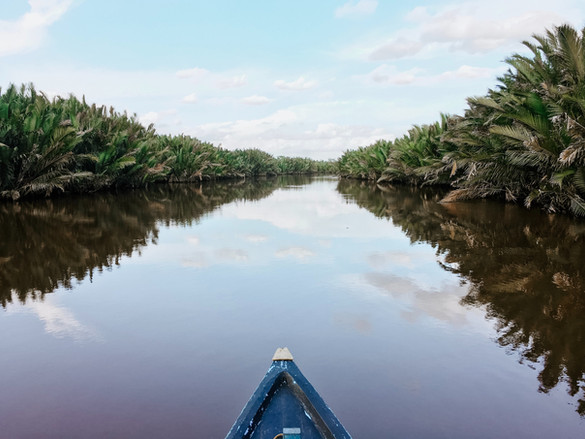Borneo, Borneo, Wherefore art thou Borneo.
- Katie

- May 5, 2020
- 4 min read
So, this week I should have been boarding a plane to fly to Kuala Lumpur ,in Malaysia . We would have then travelled from there over to Kota Kinabalu, Sabah ,on the island on Borneo to stay for 14 days working on conservation projects, seeing the amazing biodiversity, visiting a orangutan and sun bear sanctuary and visiting palm oil plantations. I had been preparing for this trip since I started my MSc in September 2018 , but I refuse to be sad!- I just get to hang on to the excitement for a bit longer till were all safe and aloud to travel again.
So instead, I will write about what I was going out to Borneo to do and the ecological problems this incredible island faces.
I will talk about the main issue we were covering on our trip -Palm Oil. THE GOOD, THE BAD AND THE UGLY. This trip is part of a module called 'Understanding Biodiversity and Sustainability'. So it has been very important to understand all aspects of this issue, including the economics, practices and effects on wildlife.
The issues of Palm Oil are most widely known for being connected to Orangutans and de-forestation. It is shown through flashes in the media, yet with so many other environmental issues being discussed all the time, I think it is good to keep talking about this topic- as it is still very much important. I think it is important when we feel passionate about an environmental issue to understand the facts, figures and small details so we can build a well put together picture in our minds. So to begin- what is Palm Oil?
‘Palm Oil’ is the oil derived from Palm Trees. There are two species of oil palm and both grow in the tropics: African oil palm (Elaeis guineensis) and American Oil Palm (Elaeis oleifer) . These trees are native to South America and West Africa and were introduced to countries in south-east Asia such as Papua New Guinea, Indonesia and Malaysia in the early 19th century . 40KG of oil is produced by a single tree each year, which makes it a very resourceful commodity and palm oil itself is a really useful product. So useful, that it is used in over 50% of all consumer goods. It is in products such as make up, food, shampoo, biofuel and much more. Malaysia and Indonesia produce 85% of the world’s Palm oil and there are 42 countries that also produce Palm oil , including Thailand, Columbia and Nigeria. Growing palm is one of the most profitable land uses and has expanded economic growth in many countries. At a local level, palm oil production has bought money in to communities to improve rural poverty. For Indonesia, palm oil is one of the most important industries contributing between 1.5-2.5 of the countries GDP.

Unfortunately, however good for many countries economic growth, the unsustainable production has caused awful consequences. Palm oil is the leading cause of rainforest destruction in South East Asia. On average up to 300 football fields of forest are cleared every hour for Palm oil plantations . On islands such as Borneo and Sumatra, the Palm oil industry has caused much de-forestation in order to keep up with high demand. This in turn has caused habitat loss, fragmentation and displacement for much of the wildlife in these areas; including the Orangutan, Sumatran Rhino and Pygmy Hippo . Large losses of pristine habitat has caused a dramatic decline in the biodiversity across both islands, historically know for its species richness. Land use for Palm oil production also has cultural and economic effects for communities in these areas, causing conflicts with local people over traditional land rights . Palm oil also contributes to climate change. Indonesia is the 3rd largest contributor to carbon output in the atmosphere due to the extensive de-forestation from Palm oil production and peat swamp conversions into Palm oil plantations .

More sustainable practices for Palm oil production have grown over the last decade from re-using the same plantations. RSPO (Roundtable for Sustainable Palm Oil) is an organisation set up in 2004 , to offer advice and guidelines for a greener production of Palm oil and a sustainable growth of plantations . Unfortunately, only 19% of Global Palm oil is certified by the RSPO . The Industry creates so many jobs and drives the local economy.- yet the environmental impacts are serious.
How can we help? We can all make a difference. Check to see if the products we are buying contains palm oil and if it is sustainably sourced. It is easier said than done to boycott palm oil as it is in so many of our products and creates a huge revenue for countries such as Indonesia. Alternative vegetable oils are not as efficiently grown and could take longer to produce- which could cause a worst environmental impact. Palm oil is in too high global demand to stop but it can be produced with out destroying the environment, we just need to make that happen.
Thank you for reading !
Stay safe and wild.
Katie x










Comments